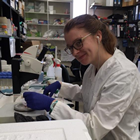Doctoral Student Profiles
 Cynthia Adebayo, BS, is a doctoral student in the Department of Environmental Health Sciences with
an interest in combining science and community partnerships to tackle environmental
justice and better the health of vulnerable communities. Cynthia's research focuses
on analyzing the metabolic exposome to characterize exposure to PFAS and other contaminants
from personal product usage, as well as diet.
Cynthia Adebayo, BS, is a doctoral student in the Department of Environmental Health Sciences with
an interest in combining science and community partnerships to tackle environmental
justice and better the health of vulnerable communities. Cynthia's research focuses
on analyzing the metabolic exposome to characterize exposure to PFAS and other contaminants
from personal product usage, as well as diet.
 Adedamola Adenekan is a doctoral student in the Department of Environmental Health Sciences and an international
student from Nigeria. His research interests lie at the intersection of environmental
health and toxicology, focusing on the impact of environmental stressors on both ecosystems
and human health. Specifically, Adedamola is dedicated to understanding how agrochemicals,
herbicides, and other pollutants affect ecological systems and human well-being, especially
in the context of developing countries. He is excited to work with Dr. Manz on a project
concerning the destruction of PFAS. Adedamola is passionate about bridging the gap
between academic research and practical environmental solutions, with a long-term
goal of establishing a research lab in Nigeria to conduct impactful public health
research and contribute to global advancements in environmental health.
Adedamola Adenekan is a doctoral student in the Department of Environmental Health Sciences and an international
student from Nigeria. His research interests lie at the intersection of environmental
health and toxicology, focusing on the impact of environmental stressors on both ecosystems
and human health. Specifically, Adedamola is dedicated to understanding how agrochemicals,
herbicides, and other pollutants affect ecological systems and human well-being, especially
in the context of developing countries. He is excited to work with Dr. Manz on a project
concerning the destruction of PFAS. Adedamola is passionate about bridging the gap
between academic research and practical environmental solutions, with a long-term
goal of establishing a research lab in Nigeria to conduct impactful public health
research and contribute to global advancements in environmental health.
 David Aguilar is a doctoral student in Environmental Health Science, a Rackham Merit Fellowship
(RMF) awardee and an Environmental Toxicology and Epidemiology Training Grant (ETEP)
trainee. He is interested in characterizing novel environmental exposure-associated
biomarkers and pathologies in various organ systems using integrated spatial transcriptomics,
imaging mass spectrometry, epigenomics, digital pathology, and machine learning. Additionally,
he is interested in building biomonitoring/epidemiological tools that harness epigenetic
and medical imaging data in addition to traditional modalities.
David Aguilar is a doctoral student in Environmental Health Science, a Rackham Merit Fellowship
(RMF) awardee and an Environmental Toxicology and Epidemiology Training Grant (ETEP)
trainee. He is interested in characterizing novel environmental exposure-associated
biomarkers and pathologies in various organ systems using integrated spatial transcriptomics,
imaging mass spectrometry, epigenomics, digital pathology, and machine learning. Additionally,
he is interested in building biomonitoring/epidemiological tools that harness epigenetic
and medical imaging data in addition to traditional modalities.
 Sydney Dame is a first-year student in the Toxicology PhD program in the Department of Environmental
Health Sciences, and an Environmental Toxicology and Epidemiology Training Grant (ETEP)
trainee. They have a B.S. in Biochemistry/Molecular Biology and worked as a research
laboratory technician in Cellular and Developmental Biology before pursuing Toxicology.
They are broadly interested in the relationship between environmental health and human
health, biochemical mechanism of toxicity, metabolomics, epigenetics, and exposure
and risk assessment.
Sydney Dame is a first-year student in the Toxicology PhD program in the Department of Environmental
Health Sciences, and an Environmental Toxicology and Epidemiology Training Grant (ETEP)
trainee. They have a B.S. in Biochemistry/Molecular Biology and worked as a research
laboratory technician in Cellular and Developmental Biology before pursuing Toxicology.
They are broadly interested in the relationship between environmental health and human
health, biochemical mechanism of toxicity, metabolomics, epigenetics, and exposure
and risk assessment.
 Ariana Haidari, MS, RD, is a doctoral student in Environmental Health Sciences. She is interested
in using multi-omic methods to identify pre-clinical effects of exposures and improve
precision in environmental epidemiology. Her research focuses on how toxicant exposures
across the life span alter the epigenome, and how these alterations are related to
detectable changes in biomarker and metabolomic measurements. A registered dietitian
since 2016, Ariana is also interested in relating multi-omic data into clinical practice.
She is the founding coordinator of the Weight Inclusive Practice in Healthcare workshop,
which trains future clinicians to provide weight-inclusive medical care. Ultimately,
Ariana hopes to use her work to improve policy that prevents harmful exposures at
the individual and societal scale.
Ariana Haidari, MS, RD, is a doctoral student in Environmental Health Sciences. She is interested
in using multi-omic methods to identify pre-clinical effects of exposures and improve
precision in environmental epidemiology. Her research focuses on how toxicant exposures
across the life span alter the epigenome, and how these alterations are related to
detectable changes in biomarker and metabolomic measurements. A registered dietitian
since 2016, Ariana is also interested in relating multi-omic data into clinical practice.
She is the founding coordinator of the Weight Inclusive Practice in Healthcare workshop,
which trains future clinicians to provide weight-inclusive medical care. Ultimately,
Ariana hopes to use her work to improve policy that prevents harmful exposures at
the individual and societal scale.
 Jie He, MS, is passionate about understanding how noise exposures contribute to public health
challenges. Jie is interested in utilizing statistical analysis and machine learning
techniques to explore these complex relationships. Jie received a BS in Nursing from
Peking University in 2017 and an MS in Industrial Hygiene from the University of Michigan
in 2023.
Jie He, MS, is passionate about understanding how noise exposures contribute to public health
challenges. Jie is interested in utilizing statistical analysis and machine learning
techniques to explore these complex relationships. Jie received a BS in Nursing from
Peking University in 2017 and an MS in Industrial Hygiene from the University of Michigan
in 2023.
 Haley Jenkins, MPH, RD (she/her) is a third-year EHS doctoral student in the Meeker-Watkins lab.
She is interested in using biomarker epidemiology to understand the impact of anthropogenic
chemical exposures (e.g., pesticides) on prenatal and perinatal health outcomes and
infant/child development. Haley hopes her future research endeavors positively impact
the vast existing health disparities in environmental exposures and ultimately inform
policy change to protect vulnerable populations.
Haley Jenkins, MPH, RD (she/her) is a third-year EHS doctoral student in the Meeker-Watkins lab.
She is interested in using biomarker epidemiology to understand the impact of anthropogenic
chemical exposures (e.g., pesticides) on prenatal and perinatal health outcomes and
infant/child development. Haley hopes her future research endeavors positively impact
the vast existing health disparities in environmental exposures and ultimately inform
policy change to protect vulnerable populations.
 Evelyn Matei, MD/PhD student in the University of Michigan Medical Scientist Training Program.
She has completed half of her medical training so far, and is now pursuing her doctoral
degree in Toxicology in the department of Environmental Health Sciences. She is broadly
interested in the effects of environmental toxicant and pesticide exposure on health,
particularly in underserved, rural, and urban communities disproportionately affected
by environmental poisoning. She is excited to work with Dr. Colacino and Dr. Bakulski
on a project concerning the effects of lead exposure on the development of neurodegenerative
disease. In terms of clinical interests, she hopes to pursue residency in either Emergency
Medicine or Family Medicine, because of the connections these fields have to rural
health and toxicology. In her free time, she enjoys listening to/playing music, reading,
spending time with cats, and doing anything outdoors.
Evelyn Matei, MD/PhD student in the University of Michigan Medical Scientist Training Program.
She has completed half of her medical training so far, and is now pursuing her doctoral
degree in Toxicology in the department of Environmental Health Sciences. She is broadly
interested in the effects of environmental toxicant and pesticide exposure on health,
particularly in underserved, rural, and urban communities disproportionately affected
by environmental poisoning. She is excited to work with Dr. Colacino and Dr. Bakulski
on a project concerning the effects of lead exposure on the development of neurodegenerative
disease. In terms of clinical interests, she hopes to pursue residency in either Emergency
Medicine or Family Medicine, because of the connections these fields have to rural
health and toxicology. In her free time, she enjoys listening to/playing music, reading,
spending time with cats, and doing anything outdoors.
 Edith Mercado, is a doctoral student in the Department of Environmental Health Sciences at the
School of Public Health. Her research is focused on investigating the impact of environmental
chemical exposures (such as metals, pesticides, or PFAS) on human health in underrepresented
and marginalized communities. Additionally, she wants to enhance her science communication
skills to effectively convey her findings in both English and Spanish.
Edith Mercado, is a doctoral student in the Department of Environmental Health Sciences at the
School of Public Health. Her research is focused on investigating the impact of environmental
chemical exposures (such as metals, pesticides, or PFAS) on human health in underrepresented
and marginalized communities. Additionally, she wants to enhance her science communication
skills to effectively convey her findings in both English and Spanish.
 Lauren Middleton, MPH (she/her) is an MD/PhD student in the Department of Environmental Health Sciences.
Her research interests include how environmental chemical exposures affect the immune
system. She is particularly excited about studying associations between antibody responses
to infections and chemical biomarkers. Lauren plans to use a combination of environment-wide
association studies using NHANES, organoid co-culture, and single-cell immune profiling
to investigate immune system function. Clinically, she is currently interested in
surgery, pathology, or infectious disease. In her free time, she enjoys playing volleyball
and hanging out with her family’s dogs.
Lauren Middleton, MPH (she/her) is an MD/PhD student in the Department of Environmental Health Sciences.
Her research interests include how environmental chemical exposures affect the immune
system. She is particularly excited about studying associations between antibody responses
to infections and chemical biomarkers. Lauren plans to use a combination of environment-wide
association studies using NHANES, organoid co-culture, and single-cell immune profiling
to investigate immune system function. Clinically, she is currently interested in
surgery, pathology, or infectious disease. In her free time, she enjoys playing volleyball
and hanging out with her family’s dogs.

Jenna Miller, MS, is a doctoral student studying Toxicology in the Department of Environmental Health Sciences. Her previous work investigated the role of endocrine-disrupting chemicals in altering breast cell morphology. She will continue to pursue her research interests during her Ph.D. by investigating the intersection between immunology, pharmacology, and toxicology within cancer treatment and prevention. She aims to better understand how cancer development and treatment is impacted by environmental exposures.
 Amaleah Mirti MPH (she/her) is a first-year doctoral student in the Department of Environmental
Health Sciences. She is broadly interested in diseases and adverse medical conditions
that affect women’s health and the roles that the environment and society serve in
exacerbating those pathways. In the long-term, she hopes to focus on the relationship
between endocrine-disrupting chemicals and PCOS and endometriosis.
Amaleah Mirti MPH (she/her) is a first-year doctoral student in the Department of Environmental
Health Sciences. She is broadly interested in diseases and adverse medical conditions
that affect women’s health and the roles that the environment and society serve in
exacerbating those pathways. In the long-term, she hopes to focus on the relationship
between endocrine-disrupting chemicals and PCOS and endometriosis.
 Bethany Pace is a doctoral student in the Department of Environmental Health Sciences, with a
concentration in toxicology and a specific interest in investigating the short-term
and long-term consequences of chemical hazard exposure.
Bethany Pace is a doctoral student in the Department of Environmental Health Sciences, with a
concentration in toxicology and a specific interest in investigating the short-term
and long-term consequences of chemical hazard exposure.
 Meaghan Rea, MPH, (she/her) is a doctoral student pursuing a degree in Toxicology, and a Genome
Sciences Training Grant trainee. Meaghan's interests lie in understanding how environmental
exposures impact the placental immune response and contribute to adverse pregnancy
outcomes.
Meaghan Rea, MPH, (she/her) is a doctoral student pursuing a degree in Toxicology, and a Genome
Sciences Training Grant trainee. Meaghan's interests lie in understanding how environmental
exposures impact the placental immune response and contribute to adverse pregnancy
outcomes.
 Kimberley (Kimmie) Sala-Hamrick (she/her) is a PhD student pursuing a degree in Toxicology. She has a B.S. in Biology
from the University of Michigan and worked as a research assistant at Wayne State
University School of Medicine before starting graduate school. Her research projects
focus on developmental exposures and their possibility to affect piRNA biology in
the heart. In her free time, Kimmie enjoys exploring the great outdoors and her cats,
Aang and Bumi.
Kimberley (Kimmie) Sala-Hamrick (she/her) is a PhD student pursuing a degree in Toxicology. She has a B.S. in Biology
from the University of Michigan and worked as a research assistant at Wayne State
University School of Medicine before starting graduate school. Her research projects
focus on developmental exposures and their possibility to affect piRNA biology in
the heart. In her free time, Kimmie enjoys exploring the great outdoors and her cats,
Aang and Bumi.
 Esha Shah, MPH (she/her), is a second-year EHS doctoral student interested in studying how
environmental exposures impact maternal and fetal health outcomes such as preeclampsia.
Esha has a background in WASH and has a special interest in studying toxicants that
are found in drinking water. In her free time, Esha enjoys baking, hiking, and exploring
new coffee shops.
Esha Shah, MPH (she/her), is a second-year EHS doctoral student interested in studying how
environmental exposures impact maternal and fetal health outcomes such as preeclampsia.
Esha has a background in WASH and has a special interest in studying toxicants that
are found in drinking water. In her free time, Esha enjoys baking, hiking, and exploring
new coffee shops.
 Abas Shkembi, MS, is an industrial hygienist, environmental epidemiologist, and statistician interested
in reducing the gaps in environmental health disparities by bridging the fields of
environmental health and occupational health together.
Abas Shkembi, MS, is an industrial hygienist, environmental epidemiologist, and statistician interested
in reducing the gaps in environmental health disparities by bridging the fields of
environmental health and occupational health together.
 Jennifer Smith is a doctoral student in the Department of Environmental Health Sciences pursuing
a PhD in Toxicology. She is interested in the effects of environmental toxicants on
gene expression, and their subsequent contributions to abnormal neurobehavioral deficits
in adulthood. She has a passion for maternal and fetal health, and hopes to study
the effects of these gene-toxicant interactions in utero. Jennifer hopes to elucidate
the various barriers that may exist amongst different populations because of epigenetic
setbacks that have occurred as a result non-consensual toxic exposure. She seeks to
use her research as a tool to advocate for widespread policy change in urban and rural
areas, and other locations of uniquely high toxic exposure and poor health outcomes.
Jennifer Smith is a doctoral student in the Department of Environmental Health Sciences pursuing
a PhD in Toxicology. She is interested in the effects of environmental toxicants on
gene expression, and their subsequent contributions to abnormal neurobehavioral deficits
in adulthood. She has a passion for maternal and fetal health, and hopes to study
the effects of these gene-toxicant interactions in utero. Jennifer hopes to elucidate
the various barriers that may exist amongst different populations because of epigenetic
setbacks that have occurred as a result non-consensual toxic exposure. She seeks to
use her research as a tool to advocate for widespread policy change in urban and rural
areas, and other locations of uniquely high toxic exposure and poor health outcomes.
 Katherine (Kat) Springer, is a doctoral student in the Environmental Health Sciences Department also pursing
a certificate in Science, Technology, and Public Policy. She is an environmental epidemiologist
by training, and is interested in prenatal exposure to endocrine disrupting chemicals,
specifically phthalates, during pregnancy and their impacts on maternal mental health
and infant neurobehavior, specifically ADHD symptoms. She is also interested in investigating
how psychosocial stress and mental health can impact infant neurobehavioral outcomes.
Professionally, she aims to work as a scientific expert to help advise policymaking
at either the state or federal level.
Katherine (Kat) Springer, is a doctoral student in the Environmental Health Sciences Department also pursing
a certificate in Science, Technology, and Public Policy. She is an environmental epidemiologist
by training, and is interested in prenatal exposure to endocrine disrupting chemicals,
specifically phthalates, during pregnancy and their impacts on maternal mental health
and infant neurobehavior, specifically ADHD symptoms. She is also interested in investigating
how psychosocial stress and mental health can impact infant neurobehavioral outcomes.
Professionally, she aims to work as a scientific expert to help advise policymaking
at either the state or federal level.
 Philip Steenstra, M.S., MMAS, is a doctoral student in the Toxicology program of the Department of
Environmental Health Sciences. His research interests revolve around assessing human
exposure, measuring long-term health outcomes, and determining environmental transport
and fate of chemical hazards within the environment.
Philip Steenstra, M.S., MMAS, is a doctoral student in the Toxicology program of the Department of
Environmental Health Sciences. His research interests revolve around assessing human
exposure, measuring long-term health outcomes, and determining environmental transport
and fate of chemical hazards within the environment.
 Savannah Sturla Irizarry (she/her) a doctoral candidate in Environmental Health Sciences. She is interested
in how environmental exposures contribute to disparities in adverse birth and developmental
outcomes. Savannah aims to integrate biomarker epidemiology with mixed-methods and
community-based frameworks in her work. Savannah's dissertation focuses on prenatal
exposure to metal and metalloid mixtures through drinking water and child neurodevelopment
outcomes in Puerto Rico using both quantitative and qualitative investigation.
Savannah Sturla Irizarry (she/her) a doctoral candidate in Environmental Health Sciences. She is interested
in how environmental exposures contribute to disparities in adverse birth and developmental
outcomes. Savannah aims to integrate biomarker epidemiology with mixed-methods and
community-based frameworks in her work. Savannah's dissertation focuses on prenatal
exposure to metal and metalloid mixtures through drinking water and child neurodevelopment
outcomes in Puerto Rico using both quantitative and qualitative investigation.
 Susie Proctor (MPH) is a doctoral student in the Department of Environmental Health Sciences. She
is broadly interested in researching human exposure to industrial contaminants, such
as per- and polyfluoroalkyl substances, in vulnerable and impacted communities. Her
goal is to conduct rigorous environmental exposure and epidemiology studies which
can be translated into evidence for remediation interventions and policy changes.
She is primarily interested in understanding how early life exposures lead to future
adverse health outcomes.
Susie Proctor (MPH) is a doctoral student in the Department of Environmental Health Sciences. She
is broadly interested in researching human exposure to industrial contaminants, such
as per- and polyfluoroalkyl substances, in vulnerable and impacted communities. Her
goal is to conduct rigorous environmental exposure and epidemiology studies which
can be translated into evidence for remediation interventions and policy changes.
She is primarily interested in understanding how early life exposures lead to future
adverse health outcomes.
 Dongyue Wang, MS, is a doctoral student in the Department of Environmental Health Sciences where
he also completed his MS degree in 2023. He is broadly interested in the relationship
between environmental exposure and epigenetic regulation, especially a class of small
non-coding RNA, piRNA. He aims to identify the potential of piRNA to serve as a biomarker
for environmental exposure and ultimately to use it as a tool for epigenetic editing.
Dongyue Wang, MS, is a doctoral student in the Department of Environmental Health Sciences where
he also completed his MS degree in 2023. He is broadly interested in the relationship
between environmental exposure and epigenetic regulation, especially a class of small
non-coding RNA, piRNA. He aims to identify the potential of piRNA to serve as a biomarker
for environmental exposure and ultimately to use it as a tool for epigenetic editing.
 Meizhen Yao, MS, MB, is a doctoral student in the Department of Environmental Health Science.
She is interested in investigating the impact of a broader range of preconception
and prenatal environmental exposures on reproductive health and child development,
with a particular focus on their joint impact. She also aspires to incorporate 'omic'
technologies into environmental epidemiology study designs to explore the potential
biological mechanisms underlying the connections between risk factors and health outcomes.
Meizhen Yao, MS, MB, is a doctoral student in the Department of Environmental Health Science.
She is interested in investigating the impact of a broader range of preconception
and prenatal environmental exposures on reproductive health and child development,
with a particular focus on their joint impact. She also aspires to incorporate 'omic'
technologies into environmental epidemiology study designs to explore the potential
biological mechanisms underlying the connections between risk factors and health outcomes.
